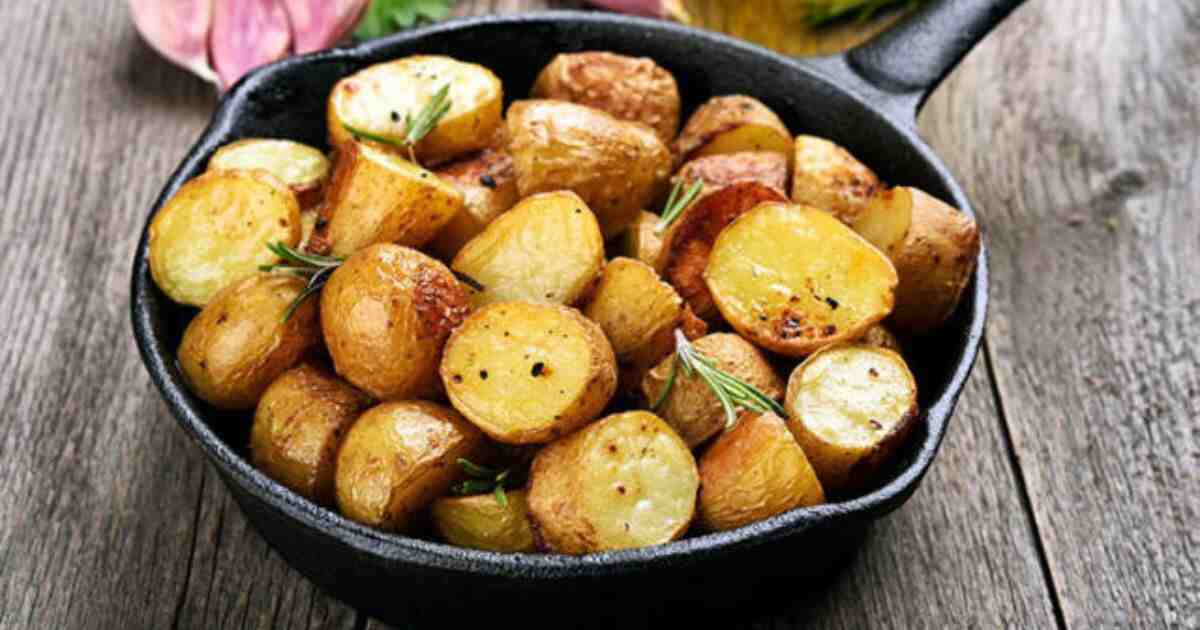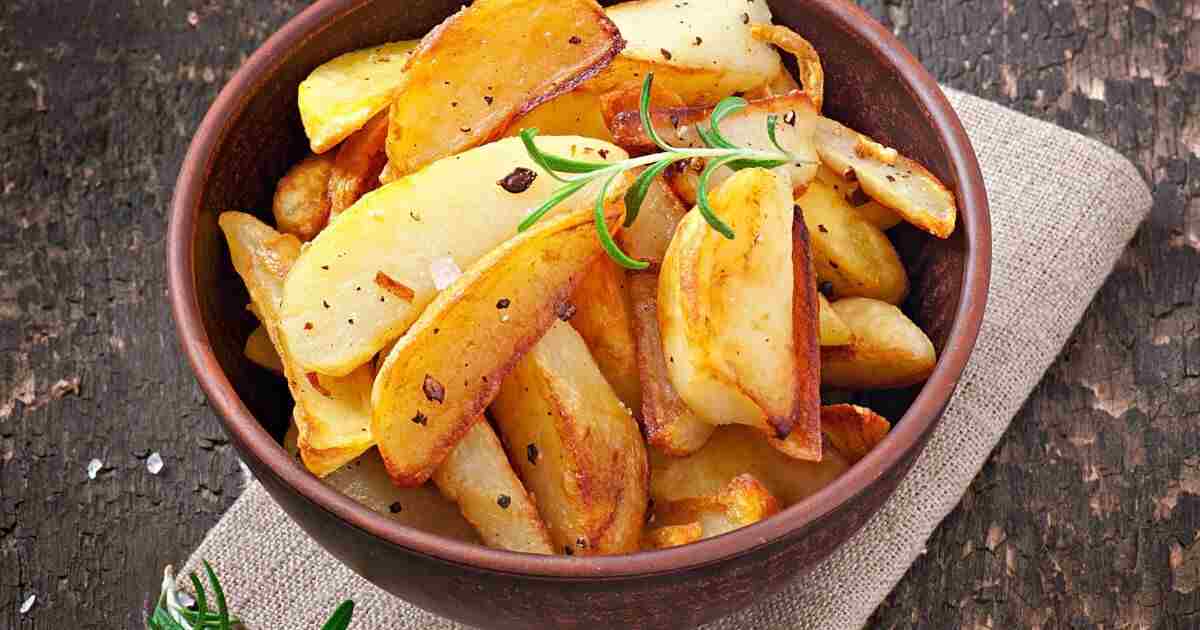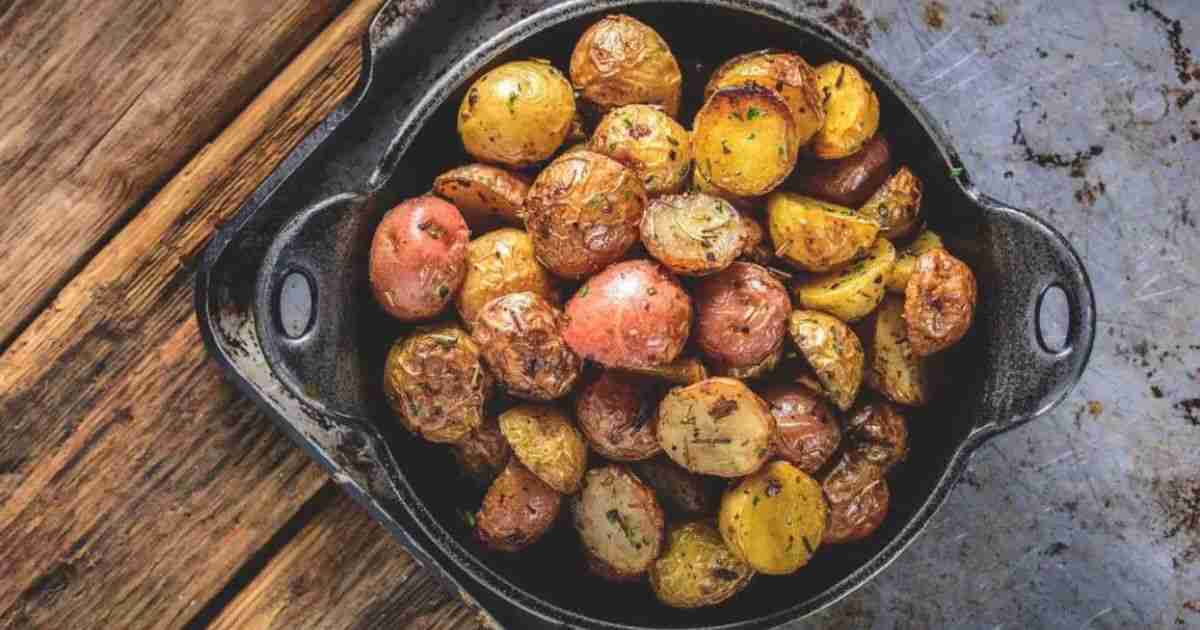Potatoes contain several vitamins, including vitamin c, vitamin b6, and potassium. These vitamins not only help in maintaining good health but also have several benefits for the body.
Potatoes, a staple food in many cultures, pack a powerful punch when it comes to nutrition. While many people know that they are a good source of carbohydrates, not everyone is aware of the vitamins and minerals found in potatoes.
A medium-sized potato contains around 36% of the recommended daily intake of vitamin c, which is vital for immune function, collagen production, and iron absorption. Additionally, potatoes are a great source of vitamin b6, which supports brain function, and potassium, which plays a crucial role in maintaining healthy blood pressure levels. In this article, we will explore in detail the vitamins and minerals found in potatoes and their benefits.

Credit: www.healthline.com
Potatoes: A Nutritional Powerhouse
Potatoes are an incredibly versatile and tasty vegetable that can be enjoyed in a variety of ways, from mashed and roasted to baked and fried. But did you know that they are also loaded with essential vitamins and nutrients that your body needs to stay healthy and strong?
In this section, we’ll explore the general nutrition information about potatoes, as well as the top vitamins and nutrients found in this beloved vegetable.
General Nutrition Information About Potatoes
Potato have a great source of complex carbohydrates, which provide your body with the energy it needs to carry out daily activities. They are also low in fat and calories, making them a healthy, guilt-free addition to any meal. Here are some key nutritional facts about potatoes:
- A medium-sized potato contains about 110 calories, 26 grams of carbohydrates, and 3 grams of protein.
- They are also a good source of fiber, with a medium-sized potato containing 2 grams of fiber, which helps to keep you feeling full and satisfied.
- Potato is naturally gluten-free, making them a great option for people with celiac disease or gluten intolerance.
- They are also high in potassium, an essential mineral that helps to regulate blood pressure and maintain healthy heart function.
The Top Vitamins And Nutrients Found In Potatoes
In addition to their general nutritional benefits, potatoes are also rich in a variety of vitamins and minerals that are essential for good health. Here are some of the top vitamins and nutrients found in potatoes:

- Vitamin c: Potatoes are one of the best sources of vitamin c, with a medium-sized potato containing over 25% of the recommended daily intake for this antioxidant vitamin. Vitamin c is important for immune system function, wound healing, and collagen production.
- Vitamin b6: This important vitamin is involved in over 100 enzymatic reactions in the body and helps to support brain function, maintain healthy skin, and regulate mood. A medium-sized potato contains over 20% of the recommended daily intake for vitamin b6.
- Iron: While many people think of red meat as the best source of iron, potato actually contain a significant amount of this essential mineral. Iron is important for red blood cell production and helps to prevent anemia. A medium-sized potato contains about 6% of the recommended daily intake for iron.
As you can see, potatoes are not only a tasty and versatile ingredient in a variety of dishes, but they are also a nutritional powerhouse that can help to keep your body healthy and strong. So the next time you’re looking for a healthy and delicious side dish, reach for a potato and enjoy all of its amazing health benefits!
Vitamin C: More Than Just Oranges
The Importance Of Vitamin C For Overall Health
Vitamin c, also known as ascorbic acid, is crucial for maintaining a healthy immune system. In addition to helping fight off infections and viruses, it also aids in collagen production, which is essential for healthy skin, hair, and nails. Moreover, it assists in the absorption of iron and promotes wound healing.
How Potatoes Compare To Other Vitamin C-Rich Foods
When we think of vitamin c, we often think of citrus fruits, but potatoes are also an excellent source of this essential vitamin. In fact, one medium-sized potato with skin contains about 30% of the recommended daily intake of vitamin c.
this equals approximately 27 mg. Compared to other vitamin c-rich foods, potatoes are close behind oranges, which have around 70 mg per 100 grams. Still, potatoes pack a more potent vitamin c punch than apples, bananas, and berries.
Ways To Maximize The Vitamin C Content In Potato Through Preparation And Cooking
While potatoes are already a great source of vitamin c, you can increase their potency by preparing and cooking them the right way. Here are a few ways to maximize the vitamin c content in potatoes:

- Choose freshly harvested potato. Vitamin c content in fruits and vegetables usually decreases over time, so it’s best to opt for potatoes that have been recently harvested.
- Keep the skin on. Most of the vitamin c content in potatoes is found in the skin, so keep it on whenever possible.
- Cook potato by steaming them, boiling them with minimal water, or microwaving them. These methods are better at retaining the vitamin c content than frying or roasting.
- Don’t cut the potatoes too small. When you cut potatoes into small pieces, the risk of losing vitamin c content increases. It’s best to keep them in bigger pieces to minimize nutrient loss.
With these tips, you can maximize the vitamin c content in your potato and enjoy all the health benefits they offer.
The Vitamin B Complex: Key Players In Your Body
Potatoes are a great source of essential vitamins, minerals, and fiber, making them a healthy inclusion in any balanced diet. In particular, potatoes are a powerhouse of the vitamin b complex.
The Different Types Of B Vitamins Found In Potato And Their Functions
Potatoes are an excellent source of b vitamins. In a single medium-sized potato, you can get up to 10% of your daily intake of many b vitamins. Here are the different types of b vitamins present in potatoes and their main functions:
- Vitamin b1 (thiamin): Thiamin helps the body convert carbohydrates into energy and aids in nerve function. This vitamin is crucial in breaking down glucose for energy purposes. Inadequate thiamin intake can cause weakness, fatigue, and irritability.
- Vitamin b2 (riboflavin): Riboflavin is involved in producing energy by helping the body convert food into energy. It also aids in the production of red blood cells and aids in the proper functioning of the immune system. Insufficient riboflavin intake can cause sensitivity to light, sore throat and anemia.
- Vitamin b3 (niacin): Niacin plays a vital role in maintaining healthy skin and proper nerve function. It is also responsible for energy conversion and aids in dna repair. Inadequate niacin intake can cause nausea, vomiting, and fatigue.
- Vitamin b5 (pantothenic acid): Pantothenic acid is essential for producing energy and synthesizing cholesterol. It is vital in the creation of red blood cells and skin cells. Insufficient intake of pantothenic acid can cause tingling sensations in the feet, numbness, and muscle cramps.
- Vitamin b6 (pyridoxine): Pyridoxine is essential in creating neurotransmitters that are responsible for regulating mood, appetite, and sleep. It is also involved in the production of hormones and red blood cells. Inadequate pyridoxine intake can cause anemia, depression, and skin rashes.
- Vitamin b7 (biotin): Biotin is vital for the metabolism of fatty acids, amino acids, and glucose. It also aids in healthy hair, skin, and nails. Insufficient biotin intake can cause brittle hair, skin rashes, and weak nails.
- Vitamin b9 (folate): Folate is crucial for healthy cell growth and helps in creating red and white blood cells. It is also essential for brain development and reduces the risk of anemia. Inadequate folate intake can cause birth defects, anemia, and poor growth.
- Vitamin b12 (cobalamin): Cobalamin is responsible for producing red blood cells, dna synthesis, and proper brain function. Inadequate cobalamin intake can cause pernicious anemia, numbness in hands and feet, and weakness.
How To Incorporate Potato Into A Balanced And Varied Diet To Meet Your Daily B Vitamin Needs
Potatoes are a versatile and delicious ingredient that can be prepared in many ways. Here are some tips on how to incorporate potatoes into your daily diet and ensure your daily b vitamin needs are met:
- Boil or roast whole potato and add them to salads, soups, or stews.
- Cook mashed potatoes and serve as a side dish to accompany meals.
- Slice potatoes and fry them to create healthy, homemade potato chips.
- Make baked potato and add your choice of vegetables, protein, and healthy fats.
- Combine boiled or baked potatoes with eggs, herbs, and spices to create a satisfying breakfast or brunch dish.
Potato should be a staple in your diet due to its nutritional benefits. With its high vitamin b complex content, incorporating potatoes into everyday meals can help ensure that you meet your daily b vitamin requirements.
Minerals In Potatoes: Beyond Potassium
Potatoes have long been a staple food in many households, appreciated for their versatility in various dishes and their nutritional values. While most people think of potatoes as a rich source of potassium, they also contain various other essential minerals that are vital for good health.
We delve into the minerals in potatoes that go beyond potassium and explain why they are important for your well-being.
Other Essential Minerals Found In Potato And Their Health Benefits
- Magnesium: This mineral helps to maintain normal nerve and muscle functions, regulates your heartbeat, and keeps your bones strong. Eating potatoes is an excellent way to ensure you meet your daily magnesium requirements.
- Phosphorus: Potato is also a great source of phosphorus, an essential mineral that supports healthy bones and teeth while helping to filter and release waste from kidneys.
How To Ensure You’Re Getting A Balanced Intake Of Minerals Through Your Potato Consumption
- Choose skin-on potatoes: The skin of potato contains most of the essential minerals, including potassium, magnesium, and phosphorus. By eating potato with their skin, you will be able to maximize your mineral intake.
- Eat potatoes in moderation: While potato is a great source of essential minerals, it’s important not to overindulge in them. Eating them in moderation as part of a balanced diet ensures you meet your nutritional requirements while avoiding any adverse effects.
- Pair potatoes with other nutrient-dense foods: Adding other nutrient-dense foods such as spinach, kale, or bell peppers to your potato-based dishes will not only enhance their flavor but also boost your overall mineral intake.
While potatoes are best known for their high potassium content, they also contain various other essential minerals, including magnesium and phosphorus. By incorporating potatoes into your diet and following the tips mentioned above, you can ensure you meet your daily mineral requirements for optimal health.
Frequently Asked Questions On What Vitamins Are In Potato
What Are The Vitamins Found In Potato?
Potatoes are a good source of vitamins c and b6. They also contain small amounts of potassium, magnesium, and iron. The skin of the potato contains more nutrients than the flesh, so it’s best to leave it on.
Is It Healthy To Eat Potatoes?
Potato is a healthy food choice when cooked in a healthy way. They are a good source of fiber, vitamins, and minerals. However, eating too many potatoes or consuming them in the form of chips or fries can lead to weight gain and other health problems.
Can Potato Help With Weight Loss?
Potatoes are a good source of fiber, which can help you feel fuller for longer and keep you from overeating. However, potatoes are also high in carbohydrates, so it’s important to eat them in moderation to avoid consuming too many calories.
Conclusion
Potato is often an underrated vegetable, but they are actually a great source of various vitamins and minerals. From vitamin c to vitamin b6 and potassium, potatoes can contribute a lot to our overall health and wellbeing. Whether you eat them boiled, baked, mashed or fried, be sure to keep the skin on as it contains the most nutrients.
With all the health benefits that potato offer, it’s no wonder they are a staple in many cultures around the world. However, it’s important to remember that potatoes should be consumed in moderation as they can be high in carbohydrates and calories.
Overall, adding potato to your diet can provide many essential vitamins and minerals while also being a tasty addition to any meal. So the next time you reach for that potato, remember all the goodness it has to offer for your body!




